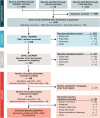A Systematic Review of Clinical Practice Guidelines for Alzheimer's Disease and Strategies for Future Advancements
- PMID: 37261607
- PMCID: PMC10310649
- DOI: 10.1007/s40120-023-00504-6
A Systematic Review of Clinical Practice Guidelines for Alzheimer's Disease and Strategies for Future Advancements
Abstract
Introduction: Alzheimer's disease (AD) is a disease continuum from pathophysiologic, biomarker and clinical perspectives. With the advent of advanced technologies, diagnosing and managing patients is evolving.
Methods: A systematic literature review (SLR) of practice guidelines for mild cognitive impairment (MCI) and AD dementia was performed following the Preferred Reporting Items for Systematic Reviews and Meta-Analyses (PRISMA). This systematic literature review (SLR) aimed to summarize current clinical practice guidelines for screening, testing, diagnosis, treatment and monitoring in the AD continuum. The results of this SLR were used to propose a way forward for practice guidelines given the possible introduction of biomarker-guided technology using blood- or plasma-based assays and disease-modifying treatments (DMTs) targeted for early disease.
Results: 53 clinical practice guidelines were identified, 15 of which were published since 2018. Screening for asymptomatic populations was not recommended. Biomarker testing was not included in routine diagnostic practice. There was no consensus on which neurocognitive tests to use to diagnose and monitor MCI or AD dementia. Pharmacologic therapies were not recommended for MCI, while cholinesterase inhibitors and memantine were recommended for AD treatment.
Discussion: The pre-2018 and post-2018 practice guidelines share similar recommendations for screening, diagnosis and treatment. However, once DMTs are approved, clinicians will require guidance on the appropriate use of DMTs in a clinical setting. This guidance should include strategies for identifying eligible patients and evaluating the DMT benefit-to-risk profile to facilitate shared decision-making among physicians, patients and care partners.
Conclusion: Regular evidence-based updates of existing guidelines for the AD continuum are required over the coming decades to integrate rapidly evolving technologic and medical scientific advances and bring emerging approaches for management of early disease into clinical practice. This will pave the way toward biomarker-guided identification and targeted treatment and the realization of precision medicine for AD.
Keywords: Alzheimer’s disease; Diagnosis; Drug therapy; Mild cognitive impairment; Systematic review.
© 2023. The Author(s).
Conflict of interest statement
Amir Abbas Tahami Monfared is an employee of Eisai Inc. He serves as Associate Editor for the Journal of Alzheimer's Disease and did not receive any fees or honoraria. Min Cho is an employee of Eisai Inc. Quanwu Zhang is an employee of Eisai Inc. Josephine Mauskopf, Isobel Pearson and NT Nhan Phan are employees of RTI Health Solutions that received funding from Eisai Inc to perform the study. Harald Hampel is an employee of Eisai Inc. He serves as Senior Associate Editor for the Journal Alzheimer's & Dementia and did not receive any fees or honoraria since May 2019. He is inventor of 11 patents and has received no royalties: In Vitro Multiparameter Determination Method for The Diagnosis and Early Diagnosis of Neurodegenerative Disorders Patent Number: 8916388; In Vitro Procedure for Diagnosis and Early Diagnosis of Neurodegenerative Diseases Patent Number: 8298784; Neurodegenerative Markers for Psychiatric Conditions Publication Number: 20120196300; In Vitro Multiparameter Determination Method for The Diagnosis and Early Diagnosis of Neurodegenerative Disorders Publication Number: 20100062463; In Vitro Method for The Diagnosis and Early Diagnosis of Neurodegenerative Disorders Publication Number: 20100035286; In Vitro Procedure for Diagnosis and Early Diagnosis of Neurodegenerative Diseases Publication Number: 20090263822; In Vitro Method for The Diagnosis of Neurodegenerative Diseases Patent Number: 7547553; CSF Diagnostic in Vitro Method for Diagnosis of Dementias and Neuroinflammatory Diseases Publication Number: 20080206797; In Vitro Method for The Diagnosis of Neurodegenerative Diseases Publication Number: 20080199966; Neurodegenerative Markers for Psychiatric Conditions Publication Number: 20080131921; Method for diagnosis of dementias and neuroinflammatory diseases based on an increased level of procalcitonin in cerebrospinal fluid: Publication number: United States Patent 10921330.
Figures
References
-
- National Institues of Health. What are clinical practice guidelines? National Library of Medicine; 2023. https://www.ncbi.nlm.nih.gov/books/NBK390308/. Accessed 6 Jan 2023.
LinkOut - more resources
Full Text Sources


